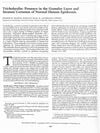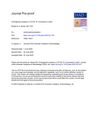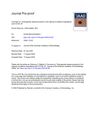 May 2023 in “International Journal of Molecular Sciences”
May 2023 in “International Journal of Molecular Sciences” Mesenchymal stem cells could help treat radiation-induced bladder damage but more research is needed to overcome current limitations.
 June 2022 in “Genetic engineering & biotechnology news”
June 2022 in “Genetic engineering & biotechnology news” A new hair loss treatment is being developed using reprogrammed stem cells to grow new hair follicles.
January 2022 in “Indian journal of drugs in dermatology” Oral minoxidil helps with hair growth but needs more research to fully understand its effectiveness and safety.
May 2021 in “F1000Research” The treatment led to denser, thicker hair growth and less hair loss.
 January 2024 in “Journal of Cosmetic Dermatology”
January 2024 in “Journal of Cosmetic Dermatology” Microneedling combined with other treatments significantly improves hair growth in people with hair loss and is safe.
 16 citations,
May 2000 in “Endocrinology”
16 citations,
May 2000 in “Endocrinology” A new gene, mrp4, is found in mice and may play a unique role in hair follicle development in tails and ears.
 44 citations,
July 2015 in “JAMA Facial Plastic Surgery”
44 citations,
July 2015 in “JAMA Facial Plastic Surgery” Fractional laser resurfacing is effective and safe for skin treatment, with benefits like less downtime and a low risk of adverse events.
 408 citations,
January 2017 in “Science”
408 citations,
January 2017 in “Science” Some wound-healing cells can turn into fat cells around new hair growth in mice.
 55 citations,
March 2015 in “Carcinogenesis”
55 citations,
March 2015 in “Carcinogenesis” WNT10A helps esophageal cancer cells spread and keep renewing themselves.
 48 citations,
May 1991 in “The journal of investigative dermatology/Journal of investigative dermatology”
48 citations,
May 1991 in “The journal of investigative dermatology/Journal of investigative dermatology” Trichohyalin is also found in the outer layers of normal human skin.
33 citations,
May 2018 in “Stem Cell Reports” Krt15+ cells in the mouse intestine resist radiation and can start tumors.
 19 citations,
September 2014 in “British Journal of Dermatology”
19 citations,
September 2014 in “British Journal of Dermatology” Minoxidil foam 5% effectively treats hair loss in both frontal and vertex scalp regions.
 44 citations,
March 1987 in “Journal of The American Academy of Dermatology”
44 citations,
March 1987 in “Journal of The American Academy of Dermatology” Using minoxidil on balding scalps can stimulate hair regrowth and increase blood flow. It's an effective treatment for early hair loss.
 42 citations,
March 2008 in “Molecular and Cellular Endocrinology”
42 citations,
March 2008 in “Molecular and Cellular Endocrinology” Hormones and neuroendocrine factors control hair growth and color, and more research could lead to new hair treatment options.
 26 citations,
October 2013 in “British Journal of Dermatology”
26 citations,
October 2013 in “British Journal of Dermatology” Hair loss risk is influenced by multiple genes.
 18 citations,
May 1988 in “Journal of The American Academy of Dermatology”
18 citations,
May 1988 in “Journal of The American Academy of Dermatology” Itraconazole helps improve tough skin infections but may not prevent them from coming back.
 157 citations,
April 1994 in “Clinical endocrinology”
157 citations,
April 1994 in “Clinical endocrinology” Androgens can cause hair growth in some areas and hair loss on the scalp.
 81 citations,
March 2009 in “Seminars in Cutaneous Medicine and Surgery”
81 citations,
March 2009 in “Seminars in Cutaneous Medicine and Surgery” Effective hair loss treatment in women requires correct diagnosis and can include medications like minoxidil, antiandrogens, and treatments for underlying conditions like PCOS.
 51 citations,
January 2012 in “Annals of Dermatology”
51 citations,
January 2012 in “Annals of Dermatology” Asian hair loss differs from Europeans; consider individual needs and psychological well-being for treatment.
 30 citations,
September 2017 in “Clinics in Dermatology”
30 citations,
September 2017 in “Clinics in Dermatology” Men with common hair loss may have a higher risk of heart disease and diabetes, and should be checked for these conditions.
 20 citations,
January 2013 in “Cell & Bioscience”
20 citations,
January 2013 in “Cell & Bioscience” Understanding how epigenetic regulation affects stem cells is key to cancer insights and new treatments.
 18 citations,
March 2008 in “British Journal of Dermatology”
18 citations,
March 2008 in “British Journal of Dermatology” Finasteride works better for hair loss in patients 26 or younger.
 15 citations,
June 2020 in “Experimental Dermatology”
15 citations,
June 2020 in “Experimental Dermatology” Hormones and genes affect hair growth and male baldness.
 15 citations,
January 1988 in “Drugs”
15 citations,
January 1988 in “Drugs” The document concludes that treatments for female hair loss and excessive hair growth are temporary and not well-studied.
 8 citations,
January 2013 in “International Journal of Trichology”
8 citations,
January 2013 in “International Journal of Trichology” The BASP classification is effective for diagnosing pattern hair loss in Indian men and women.
 8 citations,
March 2017 in “Experimental Dermatology”
8 citations,
March 2017 in “Experimental Dermatology” Finasteride helps female-pattern hair loss.
 6 citations,
July 2020 in “Journal of The American Academy of Dermatology”
6 citations,
July 2020 in “Journal of The American Academy of Dermatology” Hair loss link to severe COVID-19 unclear.
 4 citations,
August 2020 in “Journal of The American Academy of Dermatology”
4 citations,
August 2020 in “Journal of The American Academy of Dermatology” Hair loss link to COVID-19 severity likely due to other factors.
 4 citations,
February 2020 in “Dermatologic Therapy”
4 citations,
February 2020 in “Dermatologic Therapy” Poor sleep, meat-heavy diets, and junk food worsen hair loss, while sugary drinks may help.
 1 citations,
October 2015 in “CRC Press eBooks”
1 citations,
October 2015 in “CRC Press eBooks” Nutricosmetics with active ingredients can help with hair loss and improve hair growth.


























